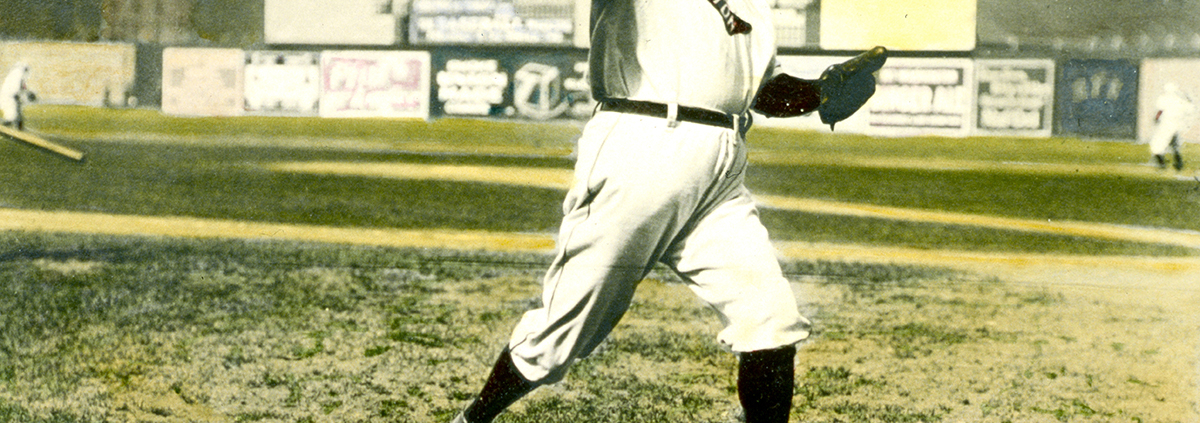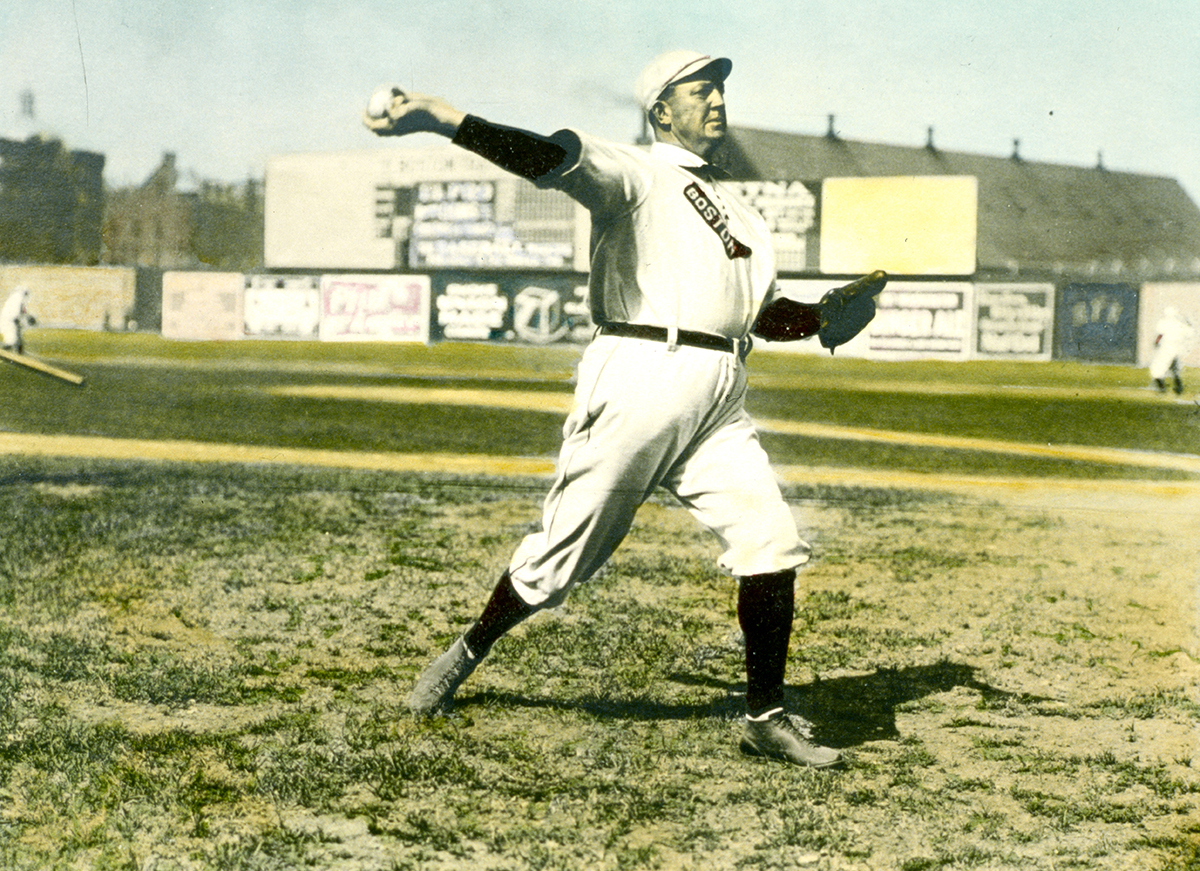April 20, 1903: Cy Young’s no-hitter collapses as A’s take second game of season-opening doubleheader
The first game of the 1903 season went nicely for the home-team Boston Americans. Kicking off a separate admission Opening Day/Patriots Day doubleheader with a 10:30 A.M. start for the first game, Boston banged out five runs in the bottom of the fourth inning and beat the Philadelphia Athletics 9-4. The win went to George Winter, the loss to Rube Waddell.
The 3:00 P.M. second game outdrew the day’s first game, 19,292 to 8,376. Both games at the Huntington Avenue Grounds outdrew the longer-established Boston Beaneaters, founded in 1876 and perennial National League champions in the 1890s.1 The Boston Herald declared the crowd at the second game as “undoubtedly the biggest ever at a ball game in this city.”2
The Athletics were a draw; they had won the American League pennant in 1902, the league’s second season of existence. Boston had finished third, 6½ games behind.
The pitching matchup was 36-year-old Cy Young for Boston and 27-year-old Eddie Plank for Connie Mack and the Athletics.
It looked as though the Bostons had the game locked up, with a 6-0 lead after six innings. Indeed, a few among the “mighty throng” may have begun to think about departing.3
But there was another source of suspense: Cy Young had a no-hitter going. He was cruising. The only Athletic to reach base through six innings was shortstop Monte Cross, who had been hit by a pitch.4 Young already had 12 seasons with 20 or more wins to his credit. In 1901 and 1902 – the first two years of the AL – he had led both leagues with 33, then 32 wins. He had thrown a no-hitter for the National League’s Cleveland Spiders in 1897.5
Boston built its lead beginning in the bottom of the second inning against Plank, a 20-game winner in 1902. Shortstop Freddy Parent dropped in a single. An out followed on a failed sacrifice. But second baseman Hobe Ferris reached on an error by Plank and the Boston battery brought home the runs – catcher Duke Farrell and pitcher Young both hitting singles.
They made it 3-0 in the third on back-to-back doubles by left fielder Buck Freeman and Parent.
Chief Bender relieved Plank in the fourth. The “Collinsmen” (future Hall of Famer Jimmy Collins was Boston’s manager and also the third baseman) padded their lead with three more runs in the fifth. Thanks to a ground rule of the afternoon, a ball hit into the crowd restrained by ropes in the outfield was a three-base hit. After one out, both Freeman and Parent tripled into the crowd. First baseman Candy LaChance singled Parent home, and both Ferris and Farrell singled behind LaChance. The three additional runs gave Boston a 6-0 lead.
And neither team scored in the sixth. As noted, Cy Young had a no-hitter going.
With just three innings to go, suddenly Young met what the newspapers called an “unexpected Waterloo.”6 It began with an error. Philadelphia first baseman Harry Davis’s grounder to Parent took an odd bounce, but the Boston shortstop was charged with an error. Third baseman Lave Cross tripled to right field and the onslaught had begun.
There were five consecutive hits off Young, three for extra bases – Cross’s hit and triples by center fielder Ollie Pickering (into the crowd in left) and left fielder Topsy Hartsel. Right fielder Socks Seybold singled to center, scoring Cross. Second baseman Danny Murphy singled to center. On a 3-and-2 count, Pickering hit his triple, driving in Seybold and Murphy. Monte Cross singled, scoring Pickering. Cross stole second, then scored with ease on Hartsel’s three-base hit to left field. By the time it was all over, the Athletics had tied the game, 6-6.
Tom Hughes relieved Young after the seventh inning, but the Athletics kept on scoring. Another triple (by Seybold) and a single by Pickering netted the go-ahead run in the eighth. Three more Philadelphia runs followed in the top of the ninth, the runs that ultimately made the difference. With one out, Bender, Hartsel, and Davis hit singles. Hartsel was thrown out at third base on Davis’s hit, but Lave Cross then hit his second triple of the game and scored on a wild pitch. It was 10-6, Athletics. Boston got one run back in the bottom of the ninth – but only one. It came on back-to-back doubles by center fielder Chick Stahl and Buck Freeman.
The final score was 10-7, Philadelphia. “Cy Young, the greatest Roman of them all, was forced to one knee and the count,” lamented the Boston Globe.7
At the end of the day, the two teams had each seen their premier pitcher lose big – Rube Waddell in the first game and Cy Young in the second. Philadelphia had left only three on base in the second game; Boston had left nine on.
The 1903 season went better for Boston than this game might suggest. Despite being bombed on Opening Day, Cy Young finished the season with a record of 28-9 (his .757 winning percentage the best in the league), with a 2.08 earned-run average. He led the majors with seven shutouts. He made 35 starts in 1903; this was the only one of his starts that he did not finish. In 1904 Young pitched a perfect game against the Athletics in Boston. His third career no-hitter came against the New York Highlanders in 1908.
Plank was a 20-game winner again in ’03 at 23-16, with a 2.38 ERA. Bender, who had relieved him and got the win in this April 20 game, was 17-14 with a 3.07 ERA. Four of the pitchers who appeared in the season-opening doubleheader – Young, Bender, Plank, and Waddell – were later inducted into the National Baseball Hall of Fame.
The Athletics were dethroned in 1903, finishing in second place, 14½ games behind Boston.
Then came the 1903 World Series – the first World Series ever staged between the American and National Leagues. It pitted the NL champion Pittsburgh Pirates against the Boston Americans. It was a hard-fought best-of-nine Series, with the Pirates winning three of the first four games but then losing four games in a row.
Acknowledgments
This article was fact-checked by Kevin Larkin and copy-edited by Len Levin.
Sources
In addition to the sources cited in the Notes, the author consulted Baseball-Reference.com and Retrosheet.org.
https://www.baseball-reference.com/boxes/BOS/BOS190304202.shtml
https://www.retrosheet.org/boxesetc/1903/B04202BOS1903.htm
Photo credit: Cy Young, 1903 (SABR-Rucker Archive).
Notes
1 The Beaneaters drew 1,827 for the first game at their home South End Grounds and 3,867 for the second. The Americans thus drew nearly five times as well for the day. Rather than plan four (or even just two) major-league games on the same day in Boston, the two teams coordinated their schedules beginning in 1904 to alternate their home openers, and more. The Beaneaters had won the pennant in 1891, 1892, 1893, 1897, and 1899, but a number of their most popular players had joined the Boston Americans in 1901.
2 “Attendance, 27,658,” Boston Herald, April 21, 1930: 9.
3 The phrase comes from W.S. Barnes Jr., “Record Crowd Greets Boston Americans,” Boston Journal, April 21, 1903: 8. The official attendance, Barnes noted, did not include “the rail-birds on fences and the gamins without number who eluded the vigilance of the police and stole in.”
4 “Cy. Young Knocked Out of the Box,” Philadelphia Inquirer, April 21, 1903: 10.
5 While a member of the Cleveland Spiders in 1892, Young had a league-leading 36 wins and a 1.93 ERA as well as a .750 winning percentage (36-12).
6 The phrase was also that of Barnes.
7 T.H. Murnane, “Same Fortune,” Boston Globe, April 21, 1903: 3.
Additional Stats
Philadelphia Athletics 10
Boston Americans 7
Game 2, DH
Huntington Avenue Baseball Grounds
Boston, MA
Box Score + PBP:
Corrections? Additions?
If you can help us improve this game story, contact us.



